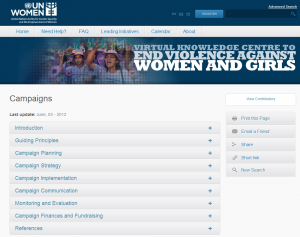New online tools launched to help campaign against violence
Date:
An online platform that helps to design programmes against gender-based violence continues to expand its scope - and its users.The Virtual Knowledge Centre to End Violence against Women and Girls(VKC) has now launched a new campaigning module.
The Centre is a unique global knowledge initiative managed by UN Women. It currently offers resources in English, French and Spanish on topics that span health, work with police, monitoring and evaluation, and many other issues. Its 800 tools can be filtered by language, country, topic and category, and include an emerging roster of organizations addressing VAW around the world.
The new Campaign module is dedicated to communications, from the crafting of messages to the use of print, audio-visual and electronic media. It offers state-of-the art tools and draws on practice case studies from around the world.
Launched two years ago, the Centre has become the “go-to on-line resource for policy-makers and practitioners. A recent survey found that its 8,500 users span more than 200 countries and territories, and 45 languages. Service providers have become the fourth largest group in the last year, while government partners have more than doubled
Nearly 70 per cent of registered members represent low and middle income countries, mostly from Latin America and Africa.
“This is an indicator that we are hitting a large part of our target audience, says Dina Deligiorgis, manager of the Centre. “We are serving those that often lack access to the global evidence-base because of language or location and who might otherwise be hard to reach for capacity development.
Recent feedback received from users across the world confirms that the Centre has supported, among many other issues, the development of public policies and legal reforms in Côte d'Ivoire and Equatorial Guinea and zero tolerance programmes for sexual harassment in South African workplaces; the costing of national plans in Cambodia, Indonesia, the Seychelles and others; and empowerment activities for acid crimes survivors in Cambodia, Nepal and Uganda.
More tools and programme modules are in the pipelines. These include: Stopping Violence before it occurs; Primary Prevention; Providing Safe and Accessible Shelter; and Addressing Sexual Violence in Conflict/Post-conflict and Emergency Settings.
